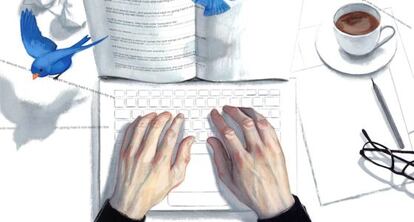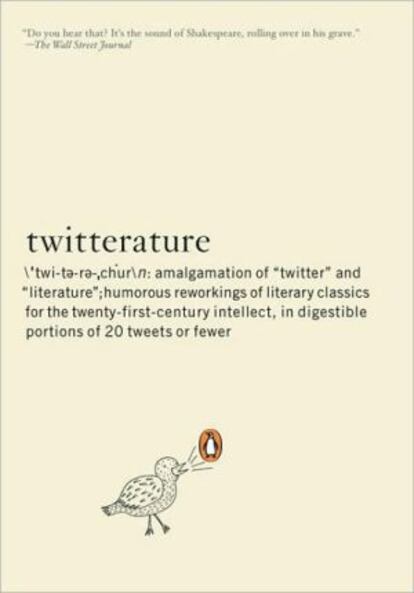Literature in 140 characters
A Spanish writer is among the participants in the second edition of the #TwitterFiction festival

That was the first step for Rosa del Blanco. A micro-tale of just 140 characters – the length of a post on Twitter – that gave her the opportunity to showcase her work alongside 50 other writers from around the world in the second edition of the #TwitterFiction festival, a literary event organized by Twitter, Penguin Random House and The Association of American Publishers (AAP).
“I had no expectations when I submitted my work,” explains Del Blanco, who is 32 and from Madrid, and is the only Spanish representative taking part in the festival. “I’ve been writing micro-literature on Twitter for a year-and-a-half, and this is the opportunity I have been waiting for to have more of a reach with my work,” she explains.

Del Blanco is sharing the literary cyberspace of the virtual festival – which began on March 12 and runs until Sunday – with another 50 writers. She was among the 25 who were chosen from an open contest, with the remaining half made up of professionals working in a variety of genres: authors of New York Times bestsellers such as Anthony Marra (A Constellation of Vital Phenomena) and J. Lynn (Nephilim Rising, Gamble Brothers), Emmy winners such as Bernie Su, and esteemed journalists with a sideline in literature, such as Elizabeth Fremantle (Vogue, Elle, Vanity Fair and The Sunday Times). What’s more, anyone is able to contribute to the festival, simply by posting a story using the hashtag #TwitterFiction.
The event offers great flexibility in terms of its conditions. Authors have the freedom to choose how they want to approach their literary project, while the organizers give each participant a time slot during which their work will be on show via the official website and Twitter feed.
The novelist Meghna Pant, for example, will be attempting to summarize 100,000 lines of the second-longest text ever written in just 100 tweets. And Australian author Omar J. Sakr will be bringing a touch of horror, by playing the role of a dead man caught in digital limbo.
Adam found the apple in a bar. He devoured it in the bathroom. Later he wondered how he could look Eve in the eye again"
Rosa del Blanco, meanwhile, offered the best of the more than 1,000 micro-stories that she has written over a year-and-a-half during two sessions. The first was on Thursday, between 11am and 12pm (Spanish time), and the second on Friday, during the same slot. Her works focus on the personal, the intimate, and border on the poetic, exploring the feminine psyche. “I talk about everything,” she explains. “About feelings, the relationship with your partner, about what keeps us awake at night… About the human condition. And what fascinates me is that with 140 characters you can leave a huge amount of space to the imagination of the reader.”
Twitter is growing as a literary medium and some authors have found huge audiences. Sean Hill has more than 190,000 followers for his Very Short Stories account, on which he has been writing tales since 2009. The project has even spawned a novel of the same name (Ulysses Press, 2013).

The opposite path, from literature to Twitter and back again, was the route taken by Alexander Aciman and Emmett Rensin, two students from the University of Chicago, who converted 80 literary classics – Hamlet, The Great Gatsby and the Harry Potter saga – into a maximum of 20 tweets. Their work was later published by Penguin Books under the title Twitterature.
The creative effervescence of the micro-blogging site is clear for all to see. But it’s a whole other issue as to whether this experimental manner of removing literature from its usual constraints can be profitable in the short or medium term. Carmen Ospina, digital director at Random House for Spain and Latin America, says there is still a lot left to do. “The majority of sales are still in the book stores,” she explains. “Literary experiments are really interesting and we want to put a lot of weight behind them. But for now there haven’t been any ‘transmedia’ projects [i.e. those that bring together a number of different paths through a digital medium] that have broken the mold.” But that’s not to say they aren’t on their way. Rosa del Blanco, representing Spain at #TwitterFiction, has no doubts. “I have spent a year trying to invent ‘twitliterature.’ Younger people read things faster and faster while doing loads of other things on the internet at the same time, and are looking for these kinds of stories. There’s a lot of work still to do – this is only just beginning.”
Tu suscripción se está usando en otro dispositivo
¿Quieres añadir otro usuario a tu suscripción?
Si continúas leyendo en este dispositivo, no se podrá leer en el otro.
FlechaTu suscripción se está usando en otro dispositivo y solo puedes acceder a EL PAÍS desde un dispositivo a la vez.
Si quieres compartir tu cuenta, cambia tu suscripción a la modalidad Premium, así podrás añadir otro usuario. Cada uno accederá con su propia cuenta de email, lo que os permitirá personalizar vuestra experiencia en EL PAÍS.
¿Tienes una suscripción de empresa? Accede aquí para contratar más cuentas.
En el caso de no saber quién está usando tu cuenta, te recomendamos cambiar tu contraseña aquí.
Si decides continuar compartiendo tu cuenta, este mensaje se mostrará en tu dispositivo y en el de la otra persona que está usando tu cuenta de forma indefinida, afectando a tu experiencia de lectura. Puedes consultar aquí los términos y condiciones de la suscripción digital.








































